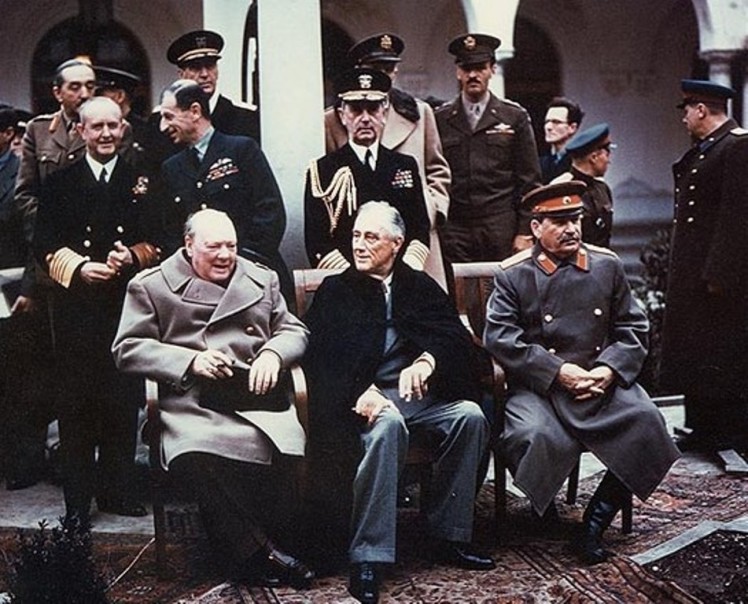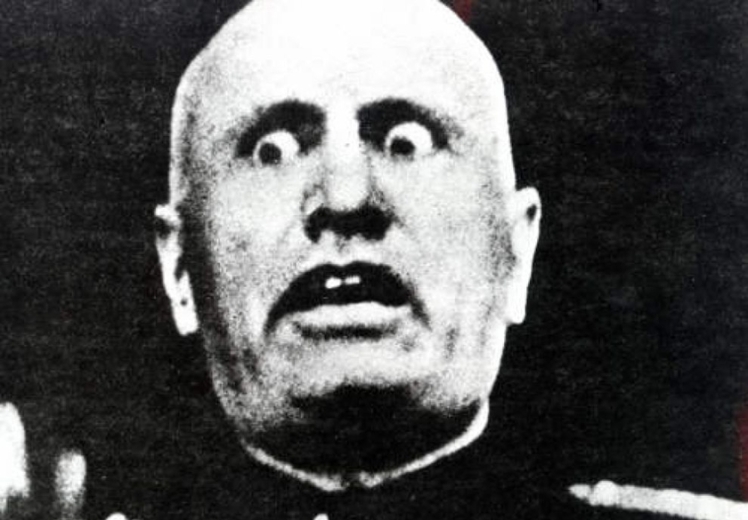Stalin, Churchill, Roosevelt – Fight!
 The Yalta Conference
The Yalta Conference
The February 1945 Yalta Conference was the second wartime meeting of British Prime Minister Winston Churchill, Soviet Premier Joseph Stalin and U.S. President Franklin D. Roosevelt. During the conference, the three leaders agreed to demand Germany’s unconditional surrender and began plans for a post-war world. Stalin also agreed to permit free elections in Eastern Europe and to enter the Asian war against Japan, for which he was promised the return of lands lost to Japan in the Russo-Japanese War of 1904-05. Although most of these agreements were initially kept secret, the revelations of the conference particulars became controversial after Soviet-American wartime cooperation degenerated into the Cold War.
The Yalta Conference was a meeting of British prime minister Winston Churchill, Soviet premier Joseph Stalin, and President Franklin Delano Roosevelt early in February 1945 as WW2 was winding down. The leaders agreed to require Germany’s unconditional surrender and to set up in the conquered nation four zones of occupation to be run by their three countries and France. They scheduled another meeting for April in San Francisco to create the United Nations. Stalin also agreed to permit free elections in Eastern Europe and to enter the Asian war against Japan. In turn, he was promised the return of lands lost to Japan in the Russo-Japanese War of 1904-1905. At the time, most of these agreements were kept secret.
Yalta became controversial after Soviet-American wartime cooperation degenerated into the cold war. Stalin broke his promise of free elections in Eastern Europe and installed governments dominated by the Soviet Union. Then American critics charged that Roosevelt, who died two months after the conference, had “sold out” to the Soviets at Yalta.
The Yalta Conference is commonly considered one of the starting points for the Cold War, as it was the base of many hostilities for the U.S. towards the Soviet Union. It was over the issue of the postwar status of Poland, however, that the animosity and mistrust between the United States and the Soviet Union that would characterize the Cold War were most readily apparent. Soviet troops were already in control of Poland, a procommunist provisional government had already been established, and Stalin was adamant that Russia’s interests in that nation be recognized. The United States and Great Britain believed that the London-based noncommunist Polish government-in-exile was most representative of the Polish people. The final agreement merely declared that a “more broadly based” government should be established in Poland. Free elections to determine Poland’s future were called for sometime in the future. Many U.S. officials were disgusted with the agreement, which they believed condemned Poland to a communist future. Roosevelt, however, felt that he could do no more at the moment, since the Soviet army was occupying Poland.
As the Cold War became a reality in the years that followed the Yalta Conference, many critics of Roosevelt’s foreign policy accused him of “selling out” at the meeting and naively letting Stalin have his way. It seems doubtful, however, that Roosevelt had much choice. He was able to secure Russian participation in the war against Japan (Russia declared war on Japan on August 8, 1945), established the basic principles of the United Nations, and did as much as possible to settle the Poland issue. With World War II still raging, his primary interest was in maintaining the Grand Alliance. He believed that troublesome political issues could be postponed and solved after the war. Unfortunately, Roosevelt never got that chance—almost exactly two months after the end of the conference, Roosevelt suffered a stroke and died.
 Benito Mussolini
Benito Mussolini